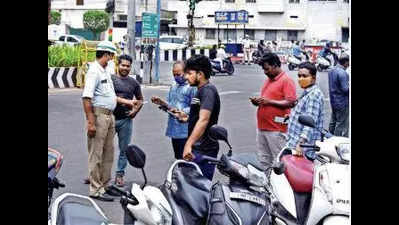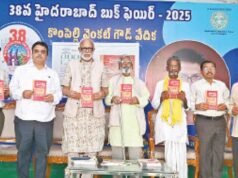Vijayawada: With traffic police intensifying vehicle and helmet checks following directions from the high court to enforce traffic regulations and clear pending challans, motorists across the state are grappling with severe inconvenience. The crackdown has exposed a glaring gap in the system, the absence of a public-friendly mechanism for motorists to view and pay their traffic challans.
Traffic challans in Andhra Pradesh are visible only through internal apps used by the traffic police. Unlike many other states that provide dedicated e-challan apps or online portals for motorists to pay the fines or penalty, AP lacks a platform where citizens can access and clear their pending fines. This has led to widespread confusion and frustration among motorists, who remain unaware of their pending challans until stopped by the traffic police.
According to traffic rules, motorists are required to pay their traffic challans within 90 days. However, lack of access to challan information makes it nearly impossible for citizens to comply with this rule. Only when stopped, they are informed by the police that the grace period has elapsed, and as a result, their vehicles would be seized till the challans are cleared.
The abrupt enforcement leaves motorists with no choice but to rush to Mee Seva centres to clear their fines, a process which is not only time-consuming but often disrupts their daily routines. Many have expressed their frustration at being penalised without prior notification, or for not given a chance to rectify their violations within the stipulated time frame.
A motorist in Vijayawada told TOI that he forgot to wear his helmet as he was in a hurry to drop his daughter, a class V student in a private school in Patamata. While returning, he was stopped near Indira Gandhi municipal stadium and levied a fine for not wearing helmet alongside a fine for “driving dangerously”, although he claimed he was driving within the 40km/h speed limit. The man was charged 1,000 for alleged overspeeding and another 100 for not wearing a helmet. “The link given by the police wasn’t working and the page just displayed ‘Bad Request’,” the man alleged, adding that the cops threatened to seize his bike, and he was forced to run to a Mee Seva centre to pay the fine amount.
Adding to the chaos, NTR district traffic DCP Krishna Murthy Naidu acknowledged a technical glitch in the system. He told TOI that while some challans are successfully processed, others remain unpaid due to system errors.
The glitch has been reported to higher authorities, and efforts are underway to find a solution, he said. A traffic cop from Prakasam district also acknowledged the issue with online payments and said they have informed their higher ups, who in turn informed the state technical services officials.
Motorists and citizen groups are now urging the state govt to introduce a traffic e-challan app or an online portal similar to those in other states. Such a platform would allow people to access their challan details, pay fines conveniently, and avoid unnecessary confrontations with traffic police. “The high court’s directive to enforce traffic regulations is commendable, but the lack of supporting infrastructure for citizens to comply highlights the need for systemic reforms. Providing a transparent and accessible mechanism for challan payments will not only ease the burden on motorists but also improve compliance and revenue collection,” said a person waiting in the queue at a Mee Seva centre in Vijayawada.
In 2023, it was found that the fines collected from people for violating traffic rules, totalling 36.53 crore, was fraudulently diverted by relatives of a retired DGP since 2019. The accused, who owned a company, was responsible for managing online payment services. The fine amount paid through various online and UPI platforms was first deposited into the DGP’s account, from where it was fraudulently transferred to the company’s bank account.
The scam came to light after an internal investigation by the police department. Since then, the system of collecting fines through various UPI platforms was stopped in the state.
Stay updated with the latest news on Times of India. Don’t miss yearly career horoscopes 2025 for Aries, Taurus, Gemini, Cancer, Leo, Virgo, Libra, Scorpio, Sagittarius, Capricorn, Aquarius, and Pisces.







